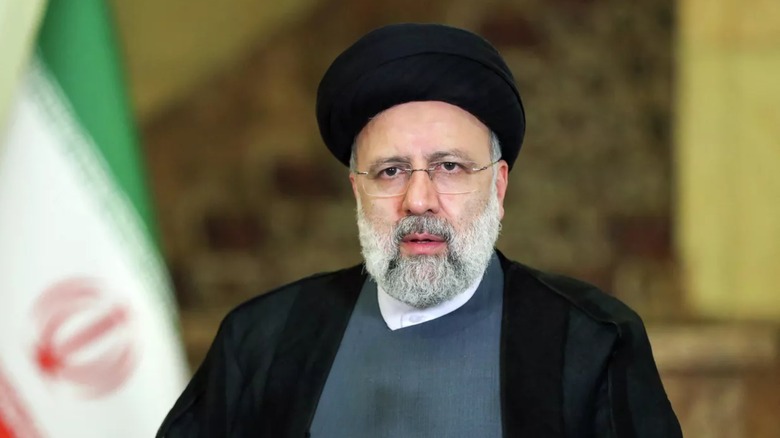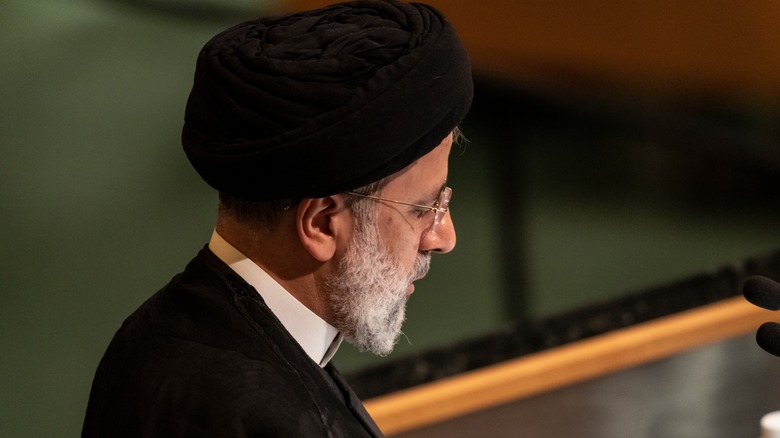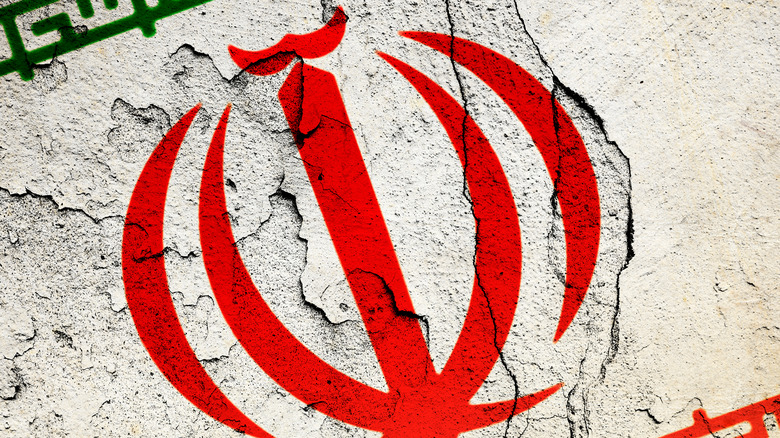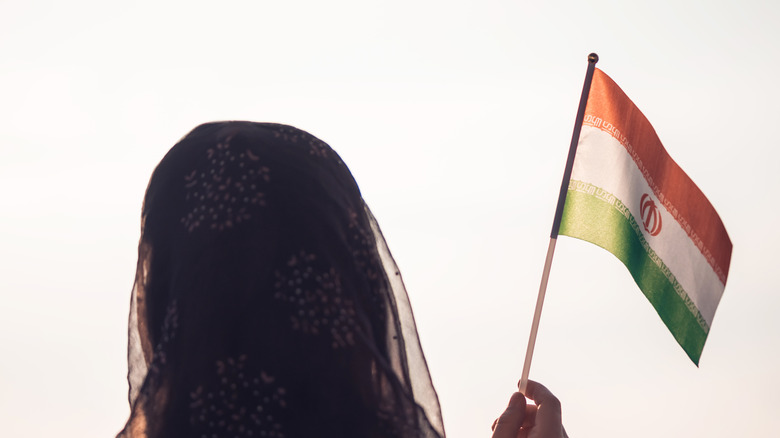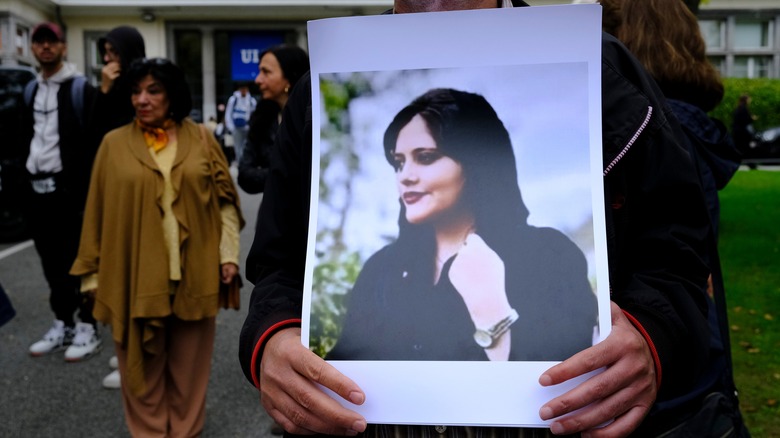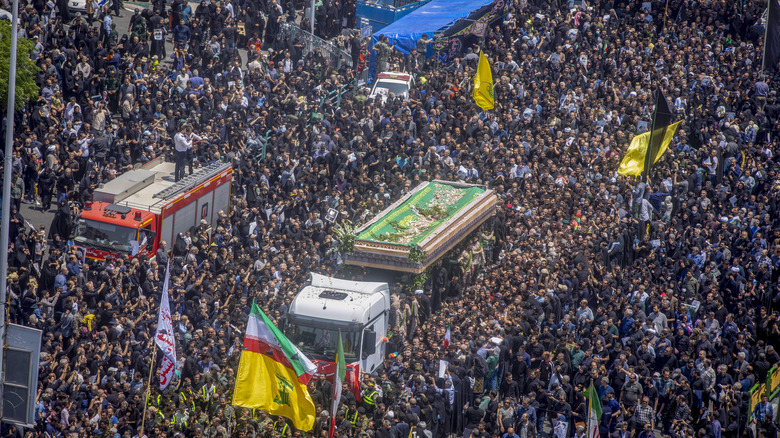Disturbing Details About The Life And Death Of Iranian President, Ebrahim Raisi
Amid the twisted metal and debris in a heavily wooded area near Iran's northwest border, lay the remains of President Ebrahim Raisi and eight others, including Foreign Minister Hossein Amir-Abdollahian. On May 19, 2024, their helicopter went down in the mountainous region near their northern neighbor Azerbaijan in foggy weather after they had attended the dedication of a new dam in the region. As the news of Raisi's death spread across the country there were both furtive celebrations and public mourning. Outside of Iran there were mixed reactions to the news as well.
Like the helicopter crash, Raisi's career in Iranian public life has been strewn with bodies, both from his time as a prosecutor and as president. In the 1980s, Raisi was part of a secretive committee responsible for thousands of executions of political prisoners. And as president, his violent response to protests in 2022 and 2023 led to hundreds of deaths.
Career as a hardline prosecutor
Long before Ebrahim Raisi became president of Iran, he already had a ruthless reputation as a prosecutor who by many accounts had a cruel streak. He began his career in 1981, two years after the Iranian Revolution that changed the country forever, dismantling Iran's liberal progress and replacing it with an ultra-conservative authoritarian Islamic state. Raisi was just 20 years old when he began his rise to power that led to him forging close relationships with Ayatollah Ruhollah Khomeini — Iran's first supreme leader and the architect of the revolution — and his successor Ali Khamenei.
In 1988, Khomeini appointed Raisi to what has become known as the "death committee." It was responsible for the executions of at least 5,000 political prisoners, whose families were never even told where they had been buried. Per The Guardian, surviving political prisoner Iraj Mesdaghi said in some cases Raisi personally oversaw the deaths. In 2021, Israel's then foreign minister, Yair Lapid, dubbed Raisi the "Butcher of Tehran" for his alleged role in these deaths (via the Associated Press).
Many believe election tampering helped elect Ebrahim Raisi
In 2021, Ebrahim Raisi, a champion of the country's hardliners, became Iran's president through what many have called a rigged election due to the disqualification of more moderate candidates. Many around the world spoke out against his victory. "That Ebrahim Raisi has risen to the presidency instead of being investigated for the crimes against humanity of murder, enforced disappearance and torture is a grim reminded that impunity reigns in supreme in Iran," Agnes Callamard of Amnesty International, the human rights NGO, told the AP after Raisi's election in 2021.
During the election Raisi promised to fight corruption, poverty, and discrimination. But under his watch, the economy faltered with a continued decline in the quality of life for many Iranians, in part due to prioritizing military spending over other areas. Corruption also continued — although there were a few bribery convictions — and there were crackdowns on personal freedoms, especially related to women. This lead to an explosion of public protests that Raisi and the other hardliners dealt with violently.
Continued curtailing of women's rights
When Ebrahim Raisi became president in 2021, his hardline policies only made being a woman in Iran that much worse. Following the Iranian Revolution of 1979, women's rights have been very limited. Since 1983, they have risked being jailed if they are caught in public without a headscarf. A year after Raisi became president, he tightened restrictions on women through harsher enforcement of the hijab law that mandated women wear a headcovering, among other regulations.
As part of the crackdown Raisi instituted the use of facial recognition software on public transportation to identify women who don't comply. He also inaugurated the first national "Hijab and Chastity Day" in July 2022. Protests followed, and some Iranian women took to social media to show themselves without a head covering in public alongside the hashtag "NoToHijab." A number of people were arrested. That fall, thousands of Iranians took to the streets after the death of a young woman at the hands of authorities who claimed she wasn't in compliance with the hijab law.
Crackdown on protests
President Ebrahim Raisi's response in the wake of nationwide protests over the controversial death of 22-year old Mahsa Amini in September 2022 is another disturbing aspect of his tenure. Eyewitnesses said Amini died after being beaten by the morality police, the agency in charge of enforcing the country's strict dress code for women. They had detained her after alleging she wasn't wearing her hijab correctly.
The incident sparked the "Women, Life, Freedom" movement, which saw Iranian women across the country burn their hijabs, march in the streets, and defiantly go out in public without a headscarf. Raisi's brutal response was unprecedented. Security forces killed at least 500 protestors and detained more than 20,000 others. The state has executed nine men linked to the protests thus far, and their were reports of widespread rapes and torture at the hands of authorities. By mid-2023, the government had managed to crush the movement through its various violent methods. Raisi and other hardliners then instituted even further restrictions on women's freedoms.
Ebrahim Raisi's death
After the helicopter collision that killed the 63-year-old president and cleric — just the latest famous person to die in a grim helicopter crash, among a long list of musicians, sports figures, and actors — rescuers had a hard time locating the accident site. The heavily forested and mountainous region remained covered in a thick fog that prevented aerial searches. They discovered the grisly scene the next day. "There is no sign of life from people on board," state TV reported after soldiers discovered the downed helicopter (via the Associated Press).
The response to the news of Raisi's death was varied. Other repressive governments praised Raisi. Russian leader Vladimar Putin called him "a true friend of Russia" whose death was an "irreparable loss" (per CNN). Chinese leadership expressed similar sentiments. On social media, Mersedeh Shahinkar, who Iranian security forces blinded during the 2022 protests, took to X, formerly Twitter, to express her happiness. "We freely dance and celebrate on your dirty grave," she wrote.
